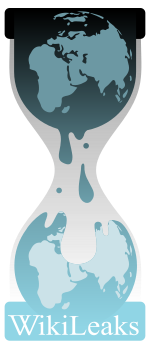WikiLeaks

WikiLeaks is a non-profit organization which uses its website to publish governmental, private data, corporate or religious documents that had previously been secret. The website was started in 2006 by Julian Assange. It had over 1.2 million documents in its database by the time one year had passed. Usually, it does not give out the names and addresses of people who post documents. The site is based in Sweden. Though its name is similar to Wikipedia, it is not related to Wikipedia or the Wikimedia Foundation.[1] The name was chosen because WikiLeaks used a wiki model at first, where people could edit the site, but it has since changed and is no longer open for editing.
History
[change | change source]In July 2010, WikiLeaks was in the news for publishing over 76,900 documents related to the War in Afghanistan. In October that same year, WikiLeaks posted almost 400,000 documents that were about the War in Iraq.
This was the largest ever leak of documents about the US Army. It reported mainly on deaths of civilians, soldiers, and sightings of homemade bombs or armed civilians.[2]
On 28 November 2010, WikiLeaks and five major newspapers - from Spain (El País), France (Le Monde), Germany (Der Spiegel), the United Kingdom (The Guardian), and the United States (The New York Times) - all began to publish the first 291 of 251,287 confidential diplomatic cables from 274 embassies dated from 1966–2010.[3] WikiLeaks plans to release all of the cables in phases over several months.[3]
This leak was widely covered by the international media, as many of the leaks contained information that affected countries other than the United States.[4][5][6][7][8] Some leaks were published by other news organizations like Fairfax Media.[9] White House Press Secretary Robert Gibbs said that an "open and transparent government is something that the President believes is truly important. But the stealing of classified information and its dissemination is a crime".[10]
In August 2016, WikiLeaks posted more than 20,000 emails from the Democratic National Committee (DNC) that showed they tried to undermine Bernie Sanders.[11]
Related pages
[change | change source]References
[change | change source]- ↑ "Wikimedia Blog:What's in a name? In the case of 'wiki', lots of things". Archived from the original on 2011-02-08. Retrieved 2011-02-12.
- ↑ David Icke. "WikiLeaks to release 400,000 Iraq war files". Archived from the original on 18 October 2010. Retrieved 7 December 2010.
- ↑ 3.0 3.1 Danielle, Kris (25 November 2010). "1,796 Memos from US Embassy in Manila in WikiLeaks 'Cablegate'". ABS-CBN News. Retrieved 29 November 2010.
- ↑ "NZ govt silent on Wikileaks cables". 12 December 2010. Retrieved 15 December 2010.
- ↑ Jill Dougherty and Elise Labott (15 December 2010). "The Sweep: WikiLeaks stirs anarchy online". CNN. Archived from the original on 22 December 2010. Retrieved 15 December 2010.
- ↑ "Bollywood critics may have to think again". 16 December 2010. Retrieved 16 December 2010.
- ↑ "Zanu PF to rethink participation in inclusive govt: Mugabe". 15 December 2010. Retrieved 16 December 2010.
- ↑ "WikiLeaks on Junta Leaders: 'Like Talking to Dead People'". 15 December 2010. Archived from the original on 16 December 2010. Retrieved 16 December 2010.
- ↑ Dorling, Philip (11 December 2010). "How I Met Julian Assange and Secured the American Embassy Cables". The Sydney Morning Herald. Retrieved 13 December 2010.
- ↑ Gibbs, Robert (29 November 2010). "Press Briefing by Press Secretary Robert Gibbs, 11/29/2010". White House Office of the Press Secretary.
I think it is safe to say that the President was – it's an understatement – not pleased with this information becoming public. As you saw during the presidential campaign and during his time in the White House, open and transparent government is something that the President believes is truly important. But the stealing of classified information and its dissemination is a crime.
Secondary source coverage is extensive, i.e., Time, USA Today, etc. - ↑ Taylor, Jessica (7 August 2016). "Jill Stein Wins Green Party Nomination, Courting Disaffected Sanders Supporters". NPR.
Other websites
[change | change source]- Wikileaks to release thousands of secret documents; 'international embarrassment' likely, 27 November 2010
- Files will risk 'countless' lives, Obama administration warns Wikileaks, 28 November 2010
- Wikileaks website attacked; millions of files to be released tonight, 28 November 2010
- Wikileaks cable disclosure shows Arab fears of Iranian ambitions, 30 November 2010
- Latest 'CableGate' disclosures hint at US diplomatic tactics in Spain and beyond, 1 December 2010
- Interpol orders arrest of Wikileaks founder to face rape charges, 2 December 2010
- Leaked cables cause Australian concern, 10 December 2010
- Julian Assange held while Sweden appeals bail, 15 December 2010
- Australian Federal Police say Wikileaks committed no crime, 17 December 2010
- Wikileaks founder Julian Assange granted bail, set free, 17 December 2010
- UN probing allegations US is 'torturing' soldier over leaks, 23 December 2010
- WikiLeaks Fan Club
- WikiLeaksNews.org (An unofficial WikiLeaks news resource & social network)
